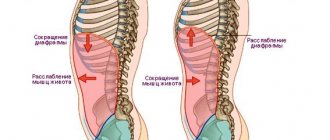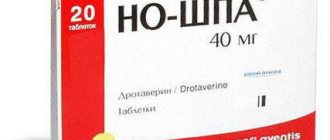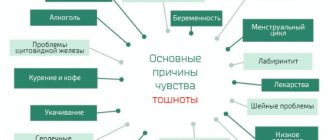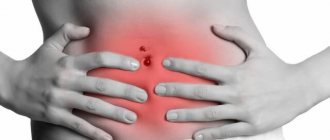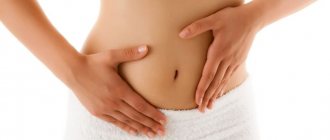Painful sensations during menstruation are not uncommon. The symptom is paroxysmal and spasmodic. The symptom extends to the lumbar region. The present symptom cannot be ignored. If you regularly have stomach pain during menstruation, contact your gynecologist. Along with the symptom, bloating and heaviness may appear. Only minor pain is considered normal. If symptoms become more intense, consult your doctor. Sometimes a sign indicates the course of pathological processes that require urgent treatment. It is important to pay attention to the intensity and localization of the painful syndrome.
If you have very severe abdominal pain, you should consult a doctor.
Why does pain occur?
The sensations may be due to various root causes, which are described in the table.
| Increased prostaglandins | For this reason, pain in women occurs in approximately 70% of women. The condition is accompanied by minor discomfort in the lower abdominal cavity. The symptom may extend to the lumbar region. |
| Product sensitivity | During menstruation, excessive sensitivity to certain foods may occur. This leads to stimulation of the walls of the gastrointestinal tract. Discomfort and nausea occur. |
| Diseases of the genital organs | Pain can occur due to inflammatory processes in the reproductive organs. In this regard, discomfort may affect the upper and lower abdominal cavity. Also, the appearance of the symptom may be affected by the incorrect location of the uterus. |
| Hormonal imbalances | Changes in hormone levels also lead to stomach pain. |
| The body's sensitivity to uterine contractions | During menstruation, the uterus contracts. This provokes the appearance of a painful sensation. The intensity of the symptom may vary. |
| Sensitivity to nervous system pathogens | Pain syndrome can be a consequence of: • stressful situations; • depression; • emotional outbursts; • nervous work. All these factors provoke pain in the abdomen. |
| Gastrointestinal diseases | At the time of menstruation, a girl’s body weakens. There is an exacerbation of existing gastrointestinal pathologies. The pain can be excessively intense, and the woman needs emergency medical help. |
| Tumor processes | Stomach pain with tumors is not the only pathological symptom. In addition, there is nausea and vomiting, as well as bloody spots in the vomit. |
| Binge eating | It is highly undesirable to overeat during menstruation. This always provokes the appearance of heaviness and pain in the stomach. Portions should be small. |
| Alcohol consumption | In this case, ethyl alcohol, which is a kind of toxin, enters the already weakened body. The patient's condition deteriorates significantly. This leads to intense pain. |
Sometimes pain is a consequence of food poisoning. This is due to the penetration of pathological microorganisms into the body. The condition is accompanied by weakness, vomiting, upset stool, and increased body temperature. A woman needs the help of a doctor.
It is imperative to take into account the root cause of the painful sensation. Sometimes urgent doctor's help is required. Self-medication is strictly prohibited.
How to get rid of period pain
Is it possible to make critical days less painful, and how to relieve pain during menstruation? Will help:
- light massage of the lower abdomen in a clockwise direction, you can use St. John's wort essential oil;
- warm shower;
- taking the fetal position on the bed with your knees tucked to your stomach while lying on your side;
- tea with chamomile - it gives both a sedative and antibacterial effect, which is important for the infectious nature of pain;
- cold heating pad on the stomach.
If you experience pain during menstruation, you should avoid using intravaginal tampons and menstrual cups. Hygiene should be observed - washing at least twice a day, but you cannot take a bath on these days, as well as a hot bath or sauna. A warm shower is the best way to keep your body clean during menstrual periods. Even in the absence of pain, sexual activity is not recommended during these few days, as the risk of infections entering the body increases, and intimacy can increase discomfort.
Since it is not always possible to reduce pain during menstruation with physical influences alone, you can use analgesic tablets for pain during menstruation, but you should remember about all sorts of side effects and addiction to drugs if they are abused.
When should you take pills?
If your stomach hurts during your period, you may need to take various medications. It is highly not recommended to resort to the use of medications without a compelling reason. It is advisable to consult a doctor first.
You can take a No-shpa tablet
You should take pills only after consulting your doctor.
This will eliminate possible pathological processes. If the intensity of the symptom is increased, you can take 1 tablet of No-shpa before the ambulance arrives or a visit to the gynecologist. Read also: when can you use No-shpu during menstruation.
Use medications only as a last resort. In most cases, it is possible to cope with the symptom by following simple recommendations.
How does drug therapy work?
Most often, women use antispasmodics or NSAIDs to eliminate unpleasant symptoms. It is not advisable to use them alone, since they do not treat the cause, but relieve pain, so it is necessary to use complex therapy.
To get rid of abdominal pain during menstruation, the following groups of medications are most often used:
- Contraceptives for oral use. Contraception helps reduce discomfort. After several months of use, the pain that occurs during menstruation goes away.
It is recommended to take a sedative, for example, Novo-Passit
- Sedatives. If a woman is often nervous, she may experience pain during menstruation. The condition is treated using sedatives, for example, tincture of valerian or motherwort, Novo-Passit, Afobazol, Tenoten.
- Painkillers or antispasmodics. You can use pills to relieve pain during menstruation. Suitable NSAIDs include Ibuprofen (Nurofen), Indomethacin, Diclofenac. Antispasmodics include Spazmalgon.
It is necessary to pay attention to the fact that strong drugs (Ketans) must be abandoned, as they irritate the mucous membrane of internal organs and this can lead to additional diseases.
What folk recipes will help?
It is allowed to use traditional methods. The main thing is to first make sure that there is no individual intolerance to the natural ingredients used.
During menstruation, the consumption of warm herbal infusions is indicated. Elecampane root is often used. Plant in the amount of 1 tsp. mix with 1 cup boiling water. The drink is infused for 3 hours. After this, the natural medicine is consumed 1 tbsp. l. three times a day.
You can make tea from raspberry leaves
Raspberry leaves are highly effective for relieving pain. 4 tsp. dry ingredient is mixed with 250 ml of boiling water. The drink is infused for 15 minutes. The medicine is taken in small sips throughout the day.
If you have intense menstrual pain, it is recommended to drink mint tea. The main thing is that the drink is not hot.
A girl can also drink chamomile-based teas. Before using any natural component, it is advisable to consult a doctor to exclude possible contraindications.
The main reason is PMS
Almost 2/3 of all women suffer from premenstrual syndrome to some extent. About a week before the onset of menstruation, the following signs appear:
- Pulls in the lower abdomen. The pain is usually not acute.
- Fluid is retained in the body, limbs swell.
- Aching, pulling in the lower back. Discomfort sometimes extends to the entire hip area.
- The mammary glands increase in size.
- The stool is disrupted, nausea and stomach discomfort appear.
- Neurological and psycho-emotional disorders are observed: frequent mood swings, increased irritability, insomnia, fatigue.
The main reason why the stomach hurts during menstruation is the increased production of estrogens, which are necessary for the attachment of the egg to the wall of the uterus and the development of the embryo. Hormones prepare the body for pregnancy. If it does not occur, under the influence of prostaglandin, uterine spasms begin and the endometrium is rejected. The process is accompanied by uterine bleeding.
The pain is most severe on the first day of regulation. On the third day it leaves.
Spasms and enlargement of the uterus cause pain in the abdomen and lower back during menstruation.
What effective procedures exist?
Electrophoresis with novocaine in the solar plexus area is quite effective. Typically, 6–8 procedures are recommended for patients. Treatment should be completed before the start of menstruation.
Electrophoresis may be prescribed for relief.
The following also have a positive effect on the body:
- reflexology;
- cupping massage;
- bloodletting using hirudotherapy.
The procedures must be completed before menstruation begins. Any manipulation should only be carried out by a professional.
Maybe it's dysmenorrhea
Sometimes the stomach hurts terribly during menstruation, often with algodismenorrhea. The term refers to painful menstrual bleeding, which is accompanied by psychoemotional, neurological, and hormonal disorders.
There are primary and secondary dysmenorrhea. In the first case, the pathology develops in adolescents.
The reasons may be varied:
- Hormonal imbalance. There is a significant predominance of estrogens over progesterones.
- Neuropsychogenic. It develops in emotional girls who have a low pain threshold.
- Endocrine. Associated with impaired synthesis of prostaglandins that regulate the contraction of muscle tissue.
- Constitution, for example, underdeveloped uterine muscles, hypoplasticity, abnormal location, anatomical defects.
Tuesday algomenorrhea is based on a certain pathology: fibroids, endometriosis, infectious diseases.
In addition to pain in the lower abdomen with dysmenorrhea, the disease is indicated by heavy bleeding, weakness, sleep disturbances, and appetite disorders. Swelling of the labia, burning sensation, and itching in the vagina are less common.
Do I need to change my diet?
Adjusting your diet has a positive effect. You need to change your menu not only before your period. It is advisable to have proper nutrition at all times.
The following should be excluded from your daily diet:
- foods with excessive fat content;
- fried foods;
- food containing excess sugar and salt;
- alcoholic drinks;
- drinks with excess caffeine;
Avoid fried and fatty foods
- carbonated drinks;
- sauces;
- seasonings
It is better to boil or steam all foods. It is advisable to completely avoid fried foods. In addition, it is necessary to eliminate bad habits.
It is important to adhere to the drinking regime. Coffee should be replaced with herbal teas and infusions. The total amount of water per day should be about 2 liters.
The diet should be healthy and as balanced as possible. Food should contain as many vitamins as possible. Portions should be small but frequent.
When to see a doctor
If severe pain in the lower abdomen does not subside for more than two days, and menstruation is abundant, you must urgently consult a gynecologist and determine the cause of dysmenorrhea.
Also, a woman should be wary of the presence of blood clots on the pad, cycle disruption and sudden weight loss. Pain that occurs while taking oral contraceptives deserves the doctor's close attention.
To help the specialist understand the situation, the patient must provide her menstrual calendar and talk about her health in recent months. All abnormalities associated with menstruation have diagnostic value. They must be fixed.
Remember that feeling unwell during menstruation cannot be the norm. After you are treated for dysmenorrhea, start preventing painful periods. Preventive measures in this case are as follows:
- Nutrition correction. Enrich your diet with protein foods and foods high in potassium, magnesium, iron, and calcium. Eat liver, meat, buckwheat, greens, vegetables and dairy products. Avoid salty and spicy foods, seasonings, chocolate and caffeine.
- Sport. Taking the time to do some light physical activity can help prevent period pain. Do fitness or yoga, run.
- Correct perception of menstruation. Psychoneurologists equate the poor health of women during menstruation with disgust for their own body. The body reacts to this with pain.
- Hygiene. Strengthening hygiene during menstruation prevents infection of the genital organs and the development of inflammatory processes.
PS Do not ignore dysmenorrhea and do not bring it to a neglected state if your critical days are very difficult for several months. The sooner the causative disease is identified, the sooner you can return to normal health.
Classification and degrees of deviations
Most often, the stomach hurts severely on the first day of menstruation, and starting from the second day, the pain subsides. If a woman experiences severe pain on the eve of menstruation and accompanies all critical days, then a diagnosis of “dysmenorrhea” is made. Depending on the causes of occurrence, two types of pathology are distinguished:
- primary dysmenorrhea or functional. It is diagnosed when the body produces an increased amount of prostaglandins, which cause excessive contraction of the uterine muscles. In this case, painful sensations appear on the eve of menstruation and continue for another 3-4 days. This type of dysmenorrhea is typical for girls 16-25 years old. Associated symptoms include headache, diarrhea and nausea. Since pain in this case is not associated with any pathologies, ultrasound will not show any developmental anomalies or lesions in the pelvic organs. The situation may improve with age or after the birth of a child;
- secondary or acquired algomenorrhea. It appears most often in women after 30 years of age. The cause of such dysmenorrhea can be excessive excitability of the nerve roots during uterine contractions, inflammation and pathology in the organs of the reproductive system, and endometriosis. Painful sensations can also be the body’s reaction to the intrauterine device.
In the case when, over the years, pain during menstruation remains at the same level of intensity, then they are usually called compensated, but if they increase with each cycle, these are decompensated pain.
Depending on the intensity of menstrual pain, there are 4 degrees of dysmenorrhea:
- Zero degree. The pain is mild, tolerable and does not require painkillers.
- The first degree is characterized by moderate pain, which is accompanied by depression, digestive system disorders and headaches. You may feel slightly unwell and drowsy, but the woman remains incapacitated and is still physically active. In 40% of women, this stage of algomenorrhea manifests itself from the first menstruation. After childbirth or with age, the situation changes, and until the end of reproductive function, about a quarter of all women live with moderately painful periods. If the pain is at the same level, then no measures need to be taken; 1-2 painkiller tablets are enough in special cases. If they increase, mandatory consultation with a specialist is required.
- The second degree is severe menstrual pain, accompanied by nausea, chills, dizziness, migraine-like pain, general weakness and irritability. Analgesics and sedatives help correct the situation.
- The third degree of dysmenorrhea is diagnosed with very severe pain in the lower abdomen, which begins 2 or even 3 days before the regulation, and only goes away with its end. Additionally, the body temperature may rise, severe headaches may occur, which can provoke vomiting, the heart rhythm may become erratic, and heart problems may appear. A woman may faint, lose her ability to work, and ordinary painkillers from the home medicine cabinet cannot cope with the situation. This is a very dangerous degree of algomenorrhea, which can lead to disruption of the menstrual cycle, and even cause infertility. Often at this stage of dysmenorrhea, concomitant diseases of the reproductive system or nearby organs are also diagnosed.
Prevention
To avoid having to treat dysmenorrhea, it is better to initially follow simple preventive recommendations:
- do not drink alcohol, especially during menstruation;
- quit smoking;
- avoid hypothermia, overheating and any stressful situations for the body;
- do not eat junk food, spicy and very hot dishes, drink no more than 2 cups of coffee a day;
- consume fermented milk products rich in calcium (yogurt, fermented baked milk, kefir) every day;
- have an active sex life. This helps normalize blood circulation and relaxes the muscles of the genital organs;
- you should move more, walk in the fresh air, if possible, do yoga, swimming or gymnastics;
- daily baths with sea salt, alternating with cold showers, will help improve blood circulation in the pelvic organs;
- consume vitamin complexes containing calcium and magnesium;
- remove from the diet foods that cause fermentation and bloating;
- You should regularly visit a gynecologist at least once a year, and if you experience any unpleasant symptoms, you should immediately seek medical help.
A bar of chocolate, which contains calcium and magnesium and stimulates the production of endorphin, the hormone of happiness, will help improve your mood during menstruation.

